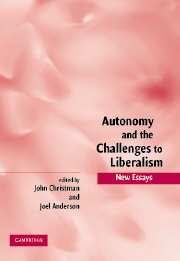Book contents
- Frontmatter
- Contents
- Contributors
- Preface
- Autonomy and the Challenges to Liberalism
- 1 Introduction
- PART I THE SELF: CONCEPTIONS OF THE AUTONOMOUS SELF
- PART II THE INTERPERSONAL: PERSONAL AUTHORITY AND INTERPERSONAL RECOGNITION
- 5 Taking Ownership: Authority and Voice in Autonomous Agency
- 6 Autonomy, Vulnerability, Recognition, and Justice
- 7 Autonomy and Male Dominance
- PART III THE SOCIAL: PUBLIC POLICY AND LIBERAL PRINCIPLES
- PART IV THE POLITICAL: LIBERALISM, LEGITIMACY, AND PUBLIC REASON
- Bibliography
- Index
7 - Autonomy and Male Dominance
Published online by Cambridge University Press: 02 December 2009
- Frontmatter
- Contents
- Contributors
- Preface
- Autonomy and the Challenges to Liberalism
- 1 Introduction
- PART I THE SELF: CONCEPTIONS OF THE AUTONOMOUS SELF
- PART II THE INTERPERSONAL: PERSONAL AUTHORITY AND INTERPERSONAL RECOGNITION
- 5 Taking Ownership: Authority and Voice in Autonomous Agency
- 6 Autonomy, Vulnerability, Recognition, and Justice
- 7 Autonomy and Male Dominance
- PART III THE SOCIAL: PUBLIC POLICY AND LIBERAL PRINCIPLES
- PART IV THE POLITICAL: LIBERALISM, LEGITIMACY, AND PUBLIC REASON
- Bibliography
- Index
Summary
In recommending to would-be princes how best to consolidate their power, Machiavelli posed the rhetorical question as to whether it was better to rule by being loved or by being feared by a populace. Machiavelli answered that it was best to rule by promoting both attitudes, but that if a ruler had to choose, he should choose to rule through fear, “for love is held by a chain of obligation which, men being selfish, is broken whenever it serves their purpose; but fear is maintained by a dread of punishment which never fails.” Machiavelli was an astute observer of human motivation, missing only that love can sometimes be grounded on fear.
Fear of other persons can have a major impact on how we live our lives. When we have to cope on a chronic basis with people who threaten to harm us, we are less able to do what we want or value, or what really matters to us. Such fears can deeply affect our capacity to live and choose autonomously. In the face of threats from those we fear, we may have to devote ourselves to self-defense and, perhaps, even to simple self-preservation. Not only do a person's particular choices and actions change as a result of her fear of others; her entire character may become distorted by the need for heightened vigilance and frequent self-defense.
There are many situations and relationships in the world that put certain people in chronic fear of certain other people.
- Type
- Chapter
- Information
- Autonomy and the Challenges to LiberalismNew Essays, pp. 150 - 174Publisher: Cambridge University PressPrint publication year: 2005
- 6
- Cited by

